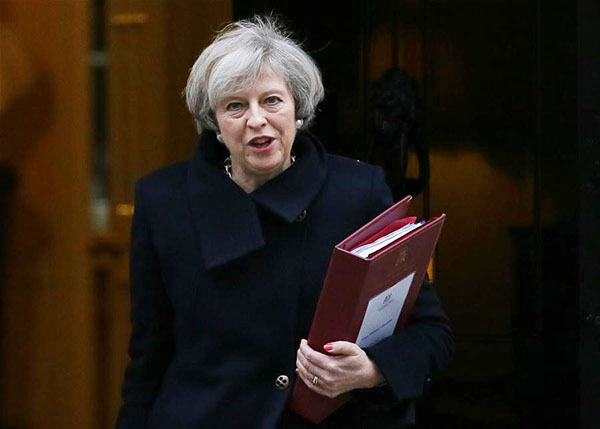British PM wins landslide final battle in House of Commons to trigger EU exit
 |
|
British Prime Minister Theresa May leaves 10 Downing Street for Prime Minister's questions at the House of parliament in London, Britain, Feb. 8, 2017. The British House of Commons on Wednesday night passed the Brexit Bill which gives the British government the power to begin the formal process of Britain leaving the European Union. [Photo/Xinhua] |
LONDON - The parliamentary bill empowering the British government to begin the formal process of leaving the European Union completed its passage Wednesday night in the House of Commons.
Prime Minister Theresa May's government succeeded in crossing the final crucial hurdle with 494 votes to 122 -- a majority of 372.
May sat in the chamber alongside her Brexit ministers as the historic result was announced by deputy speaker Lindsay Hoyle.
It now goes to the unelected House of Lords for further scrutiny before being sent to Queen Elizabeth for royal assent.
Scottish Nationalist MP Alex Salmond criticized the process and accused the government of railroading the legislation through parliament in a "disgraceful fashion.
He said this was the first time a bill of great constitutional importance had been passed in this day since the Defense of the Realm Bill prior to World War One in 1914.
Having won Wednesday night in the Commons, where a string of amendments were defeated, it almost guarantees that May will be on course to tell Brussels within weeks to start the EU exit process.
May's government only introduced the briefly worded bill into parliament last week, determined to see it fast-tracked through the parliamentary process.
It has meant members of parliament (MPs) sitting until midnight on some occasions to complete a series of debates.
Attempts by the Scottish Nationalist Party (SNP) to ensure the Scottish Parliament in Edinburgh could have a vote on Brexit, as well as a call by the minority Liberal Democrats for a second national referendum, each failed, as did a string of proposed amendments by the main opposition Labor party.
In the final vote, the result indicated that some Labor MPs had defied an instruction from their leader Jeremy Corbyn to vote in favor of the Article 50 bill.
A number of his shadow cabinet members have already resigned, and more may quit as a result of the vote.
Before the result was even announced it was reported that Labor's shadow business secretary Clive Lewis resigned from Corbyn's shadow cabinet, saying he could not vote in favor of the Brexit bill.
Under parliamentary convention in Britain a minister or shadow minister disobeying the leadership is expected to resign or be fired. The vote will add to the ongoing civil war within the Labor Party that erupted after Corbyn's election as leader.
During a day of intensive debates, MPs failed by 332 votes to 290 to ensure EU nationals lawfully resident in Britain on the date of last June's EU referendum would have the right to stay in Britain.
Another vote called for Britain to remain as a member of Euratom, the European Atomic Agency Community. This was also lost with a vote of 287 in support and 336 against, another victory f
Brexit Minister David Jones had confirmed during the debate that Britain leaving the EU also meant leaving Euratom.
But he added that the government wants to maintain successful cooperation with the EU and says this will be a matter for negotiation with Brussels.
On the residence rights of EU nationals in Britain, Jones said the government recognizes issue is extremely important and will addressed as a matter of priority.
As MPs were voting, a group of MPs burst into song in the chamber of Commons where even applause if frowned upon. The choir was silenced by an order from Deputy Speaker Lindsay Hoyle.









